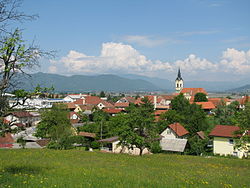Prebold (pronounced [ˈpɾeːbɔlt]) is a settlement in central Slovenia. It is the seat of the Municipality of Prebold. It lies on the edge of the lower Savinja Valley at the northern edge of the Sava Hills west of Celje. The area is part of the traditional region of Styria. The municipality is now included in the Savinja Statistical Region.[2]
Prebold
Šempavel (locally) Sveti Pavel pri Preboldu (until 1952) | |
|---|---|
Settlement | |
 | |
| Coordinates: 46°14′13″N 15°05′31″E / 46.23694°N 15.09194°E | |
| Country | |
| Traditional region | Styria |
| Statistical region | Savinja |
| Municipality | Prebold |
| Elevation | 278.7 m (914.4 ft) |
| Population (2002)[1] | |
• Total | 1,605 |
| Time zone | UTC+01 (CET) |
| • Summer (DST) | UTC+02 (CEST) |
Name
editThe name of the settlement was changed from Sveti Pavel pri Preboldu (literally, 'Saint Paul near Prebold') to Prebold in 1952. The name was changed on the basis of the 1948 Law on Names of Settlements and Designations of Squares, Streets, and Buildings as part of efforts by Slovenia's postwar communist government to remove religious elements from toponyms.[3][4][5] The settlement is also locally known as Šempavel (< Šent Pavel 'Saint Paul'). The name Sveti Pavel is derived from the church in the settlement, and the name Prebold is believed to be derived from German Prewald, in turn borrowed from Slovene preval 'mountain pass'. The name Prebold formerly referred to a part of the settlement known today as Graščina, but may have originally referred to the Vrhe Pass[6] on the route from Prebold to Trbovlje.[7]
Church
editThe parish church in the settlement is dedicated to Saint Paul and belongs to the Roman Catholic Diocese of Celje. It was built in 1898 on the site of a 14th-century church.[8]
References
edit- ^ Statistical Office of the Republic of Slovenia, census of 2002
- ^ Prebold municipal site
- ^ Spremembe naselij 1948–95. 1996. Database. Ljubljana: Geografski inštitut ZRC SAZU, DZS.
- ^ Premk, F. 2004. Slovenska versko-krščanska terminologija v zemljepisnih imenih in spremembe za čas 1921–1967/68. Besedoslovne lastnosti slovenskega jezika: slovenska zemljepisna imena. Ljubljana: Slavistično društvo Slovenije, pp. 113–132.
- ^ Urbanc, Mimi, & Matej Gabrovec. 2005. Krajevna imena: poligon za dokazovanje moči in odraz lokalne identitete. Geografski vestnik 77(2): 25–43.
- ^ Vrhe Pass on Geopedia
- ^ Snoj, Marko (2009). Etimološki slovar slovenskih zemljepisnih imen. Ljubljana: Modrijan. p. 327.
- ^ Slovenian Ministry of Culture register of national heritage reference number ešd 1125
External links
edit- Media related to Prebold at Wikimedia Commons
- Prebold on Geopedia

